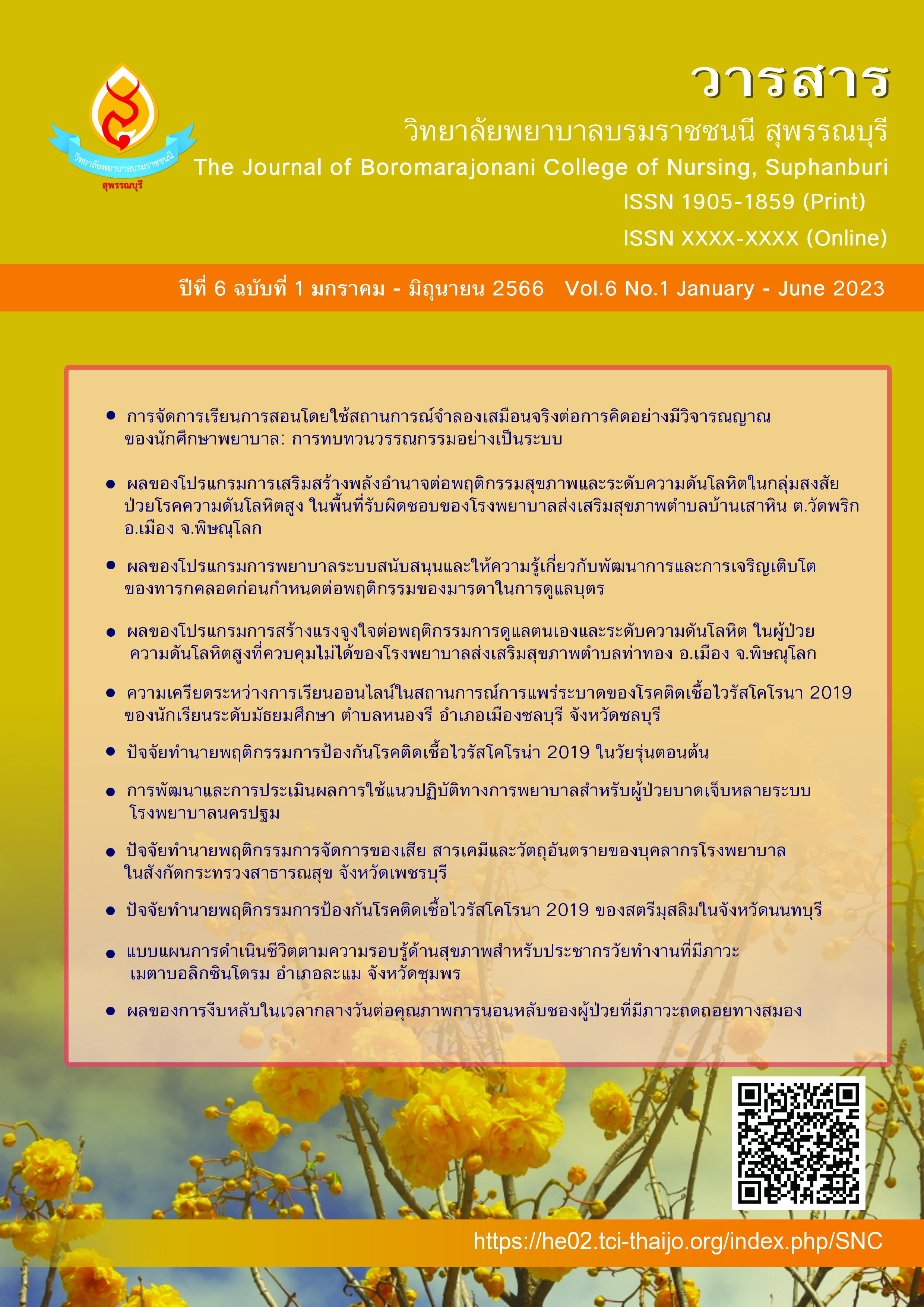ผลของการงีบหลับในเวลากลางวันต่อคุณภาพการนอนหลับชองผู้ป่วยที่มีภาวะถดถอยทางสมอง
คำสำคัญ:
การงีบหลับในเวลากลางวัน คุณภาพการนอนหลับ ผู้ป่วยที่มีภาวะถดถอยทางสมองบทคัดย่อ
การวิจัยครั้งนี้เป็นการวิจัยกึ่งทดลอง วัตถุประสงค์เพื่อศึกษาผลของการงีบหลับในเวลากลางวันต่อคุณภาพการนอนหลับของผู้ป่วยที่มีภาวะถดถอยทางสมอง โดยกลุ่มตัวอย่างคือ ผู้สูงอายุในชมรมผู้สูงอายุในจังหวัดสุพรรณบุรีที่มีภาวะถดถอยทางสมอง จำนวน 38 คน ได้ทำการงีบหลับในช่วงเวลา 13:00–15:00 น. นาน 20 นาที เป็นเวลา 8 สัปดาห์ และประเมินคุณภาพการนอนหลับโดยใช้แบบสอบถาม PSQI ฉบับภาษาไทย ก่อนและหลังการทดลอง วิเคราะห์ข้อมูลโดยการแจกแจงความถี่ ร้อยละ ค่าเฉลี่ย และส่วนเบี่ยงเบนมาตรฐาน และใช้ Komogorov-Smirnoff test ในการหาการแจกแจงปกติ ส่วนการวิเคราะห์ผลก่อนและหลังการทดลองใช้ Wilcoxon signed-rank test
ผลการศึกษาพบว่า หลังการทดลองกลุ่มตัวอย่าง ทั้ง 38 คน มีคุณภาพการนอนหลับดีขึ้น โดยที่ 11 คนที่ก่อนการทดลองมีคุณภาพการนอนดีอยู่แล้ว และหลังการทดลองคุณภาพการนอนก็ดีขึ้นกว่าเดิม อย่างมีนัยสำคัญทางสถิติ (p<0.05) และอีก 27 คนที่ก่อนการทดลองมีคุณภาพการนอนไม่ดี หลังการทดลองก็มีคุณภาพการนอนดีขึ้นกว่าเดิม อย่างมีนัยสำคัญทางสถิติ (p<0.001) เช่นกัน แสดงให้เห็นว่า การงีบหลับในเวลากลางวันมีผลทำให้คุณภาพการนอนหลับของผู้ป่วยที่มีภาวะถดถอยทางสมองดีขึ้น
เอกสารอ้างอิง
สถิติประชากรศาสตร์. 2565. สถิติประชากรศาสตร์. http://www.statbbi.nso.go.th.
Adam P. Spira, Lenis P. Chen-Edinboro, Wu MN, Yaffe K. (2014). Impact of Sleep on the Risk of Cognitive Decline and Dementia. Current Opinion in Psychiatry, 27(6): 478–483.
American Psychiatric Association. (2013). Neurocognitive Disorder. In: Diagnostic and Statistical Manual of Mental Disorders, 5th edition. Washington, DC. American Psychiatric Association.: 591-643
Burke, S.L., Hu, T., Spadola, C.E., Li, T., Naseh, M., Burgess, A. & Cadet, T. (2018). Mild cognitive impairment: associations with sleep disturbance, apolipoprotein e4, and sleep medications. Sleep Med., 52:168–176.
Buysse, D.J., Reynolds, C.F. 3rd., Monk, T.H., Berman, S.R., & Kupfer, D.J. (1989). The Pittsburgh Sleep Quality Index: A new instrument for psychiatric practice and research. Psychiatry Research, 28(2), 193-213.
Conley, S., Feder, S. L., Jeon, S., & Redeker, N. S. (2019). Daytime and Nighttime Sleep Characteristics and Pain Among Adults With Stable Heart Failure. Journal of Cardiovascular Nursing, 34(5), 390-398.
Dzierzewski, J.M.; Dautovich, N.; Ravyts, S. (2018). Sleep and Cognition in Older Adults. Sleep Med Clin., 13(1), 93-106.
Eser, I., Khorshid, L., & Cinar, S. (2007). Sleep quality of older adults in nursing homes in Turkey: Enhancing the quality of sleep improves quality of life. Journal of Gerontological Nursing, 33(10), 42-49.
Faraut, B., Andrillon, T., Vecchierini, M. F., & Leger, D. (2017). Napping: A public health issue. From epidemiological to laboratory studies. Sleep Medicine Reviews, 35, 85-100.
Jirong, Y., Changquan, H., Hongmei, W. & Bi-Rong, D. (2013) Association of sleep quality and dementia among long-lived Chinese older adults. Age, 35(4):1423-1432
Kryger, M.H., Roth, T., & Dement, W.C. (2010). Principles and Practice of Sleep Medicine E-Book. 5th ed. Elsevier, Health Sciences.
Lavoie, C. J., Zeidler, M. R., & Martin, J. L. (2018). Sleep and aging. Sleep Science and Practice, 2(1), 1-8.
Mantau, J. & Spencer, RMC. (2017). Exploring the nap paradox: are mid-day sleep bouts a friend or foeM. Sleep Medicine, 37, 88-97.
Petersen, R.C., & Trojanowski, J.Q. (2009). Use of Alzheimer disease biomarkers: Potentially yes for clinical trials but not yet for clinical practice. JAMA, 302(4), 436-437
Praharaj, S. K., Gupta, R., & Gaur, N. (2018). Clinical Practice Guideline on Management of Sleep Disorders in the Elderly. Indian journal of psychiatry, 60(Suppl 3), S383–S396.
Postuma RB, Gagnon JF, Vendette M, Fantini ML, Massicotte-Marquez J, Montplaisir J. (2009). Quantifying the risk of neurodegenerative disease in idiopathic REM sleep behavior disorder. Neurology, 72(15), 1296-1300.
Puangsombatwanit, S. (2021). The Association between Sleep Quality and Mild Cognitive Impairment in Older Adults. Journal of Primary Care and Family Medicine, 4(1), 61-73.
Rattanawat, W., Nakawiro, D., Visajan, P. (2018). Prevalence of Mild Cognitive Impairment (MCI) in Pre-Retirement Period of Hospital Staff. The Journal of The Psychiatric Association of Thailand. 63(1), 55-64.
Roberts RO, Knopman DS, Mielke MM, Cha RH, Pankratz VS, Christianson TJ, Geda YE, Boeve BF, Ivnik RJ, Tangalos EG, Rocca WA, Petersen RC. (2014). Higher risk of progression to dementia in mild cognitive impairment cases who revert to normal. Neurology, 82(4), 317-25.
Sitasuwan, T.; Bussaratid, S.; Ruttanaumpawan, P.; Chotinaiwattarakul, W. (2014) Reliability and validity of the Thai version of the Pittsburgh Sleep Quality Index. J Med Assoc Thai, 97, Suppl 3, S57-67.
Shokri-Kojoria, E., Wanga, G.-J., Wiersa, C.E., Demirala, S.B., Guoa, M., Kima, S.W., Lindgrena, E., Ramireza, V., Zehraa, A., Freemana, C., Millera, G., Manzaa, P., Srivastavaa, T., Santib, S.D., Tomasia, D., Benvenistec, H. and Volkowa, N.D. (2018). β-Amyloid accumulation in the human brain after one night of sleep deprivation. Proceedings of the National Academy of Sciences, 115(17), 4483–4488.
Souabni, M.; Souabni, M.J.; Hammouda, O.; Romdhani, M.; Trabelsi, K.; Ammar, A.; Driss, T. (2022) Benefits and risks of napping in older adults: A systematic review. Front. Aging Neurosci., 14, 1000707.
Sun, J. L., & Lin, C. C. (2016). Relationships among daytime napping and fatigue, sleep quality, and quality of life in cancer patients. Cancer Nursing, 39(5), 383-392.
Trakulsithichoke, S. (2018). Prevention of Dementia in Older Persons. Journal of Nursing and Health Care, 36(4), 6-14.
United Nations Department of Economic and Social Affairs, Population Division. World Population Prospects 2022: Summary of Results. UN DESA/POP/2022/TR/NO.3, 2022.
Wang, Q.; Zhu, H.; Dai, R.; Zhang, T. (2022) Associations Between Total Sleep Duration and Cognitive Function Among Middle-Aged and Older Chinese Adults: Does Midday Napping Have an Effect on It? Int J Gen Med., 15, 1381-1391.
Wold, G. H. (2013). Basic geriatric nursing-E-book. Elsevier Health Sciences.
World Health Organization. Global strategy and action plan on ageing and health, World Health Organization: Switzerland, 2008.
World Health Organization. (2015). Older population and health system: A profile of Thailand, 10, 19-36.
Yin, X., Liu, Q., Wei, J., Meng, X., & Jia, C. (2018). Association of daytime napping with prediabetes and diabetes in a Chinese population: Results from the baseline survey of the China Health and Retirement Longitudinal Study. Journal of Diabetes, 10(4), 302-309.
Zhang, Z., Xiao, X., Ma, W., & Li, J. (2020). Napping in Older Adults: a Review of Current Literature. Current Sleep Medicine Reports, 6(3), 129-135.
Praison P. & Chuajedton P. (2017). Factors Related to Mild Cognitive Impairments in Elderly People in Chiang Rai Province. The Journal of Thailand Nursing and Midwifery Council, 32(1), 64–80.
ดาวน์โหลด
เผยแพร่แล้ว
ฉบับ
ประเภทบทความ
สัญญาอนุญาต
ลิขสิทธิ์ (c) 2023 วิทยาลัยพยาบาลบรมราชชนนี สุพรรณบุรี

อนุญาตภายใต้เงื่อนไข Creative Commons Attribution-NonCommercial-NoDerivatives 4.0 International License.
บทความที่ได้รับการตีพิมพ์เป็นลิขสิทธิ์ของวารสารวิทยาลัยพยาบาลบรมราชชนนี สุพรรณบุรี
ข้อความที่ปรากฏในบทความแต่ละเรื่องในวารสารวิชาการเล่มนี้เป็นความคิดเห็นส่วนตัวของผู้เขียนแต่ละท่านไม่เกี่ยวข้องกับวิทยาลัยพยาบาลบรมราชชนนี สุพรรณบุรี และคณาจารย์ท่านอื่นๆในวิทยาลัยฯ แต่อย่างใด ความรับผิดชอบองค์ประกอบทั้งหมดของบทความแต่ละเรื่องเป็นของผู้เขียนแต่ละท่าน หากมีความผิดพลาดใดๆ ผู้เขียนแต่ละท่านจะรับผิดชอบบทความของตนเองแต่ผู้เดียว



